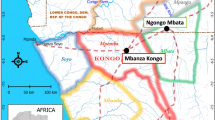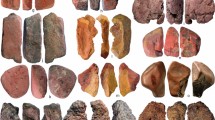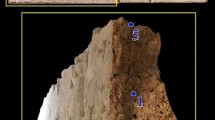Abstract
FRAGMENTS of pottery are the most common signs of human occupation on most archæological sites. Their origin can often be deduced from their shapes and fabrics. There are many cases, however, where this evidence alone is ambiguous, and the work described herewith was undertaken to investigate the possibility of identifying the origin from the concentrations of various minor or trace constituents. Such variations of composition of the ceramic body would tend to reflect the variations in the clay from which it was made1.
This is a preview of subscription content, access via your institution
Access options
Subscribe to this journal
Receive 51 print issues and online access
$199.00 per year
only $3.90 per issue
Buy this article
- Purchase on Springer Link
- Instant access to full article PDF
Prices may be subject to local taxes which are calculated during checkout
Similar content being viewed by others
References
Prelim. Reps. Reference Clay Minerals Amer. Pet. Inst., Research Project No. 49 (1951).
Birks, F. T., Atomic Energy Research Establishment C/R 1177 (1953).
Waring, C. L., and Annell, C. S., Anal. Chem., 25, 1174 (1953).
Weaver, J. R., and Brattain, R. R., Anal. Chem., 21, 1038 (1949).
Author information
Authors and Affiliations
Rights and permissions
About this article
Cite this article
RICHARDS, E., HARTLEY, K. Spectrographic Analysis of Romano-British Pottery. Nature 185, 194–196 (1960). https://doi.org/10.1038/185194a0
Issue Date:
DOI: https://doi.org/10.1038/185194a0
This article is cited by
-
Ceramic raw materials: how to recognize them and locate the supply basins: chemistry
Archaeological and Anthropological Sciences (2020)
-
Scientific methods in archaeology
Die Naturwissenschaften (1969)
Comments
By submitting a comment you agree to abide by our Terms and Community Guidelines. If you find something abusive or that does not comply with our terms or guidelines please flag it as inappropriate.



